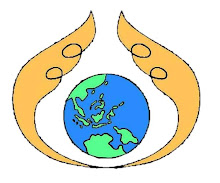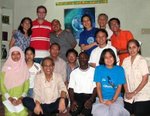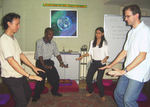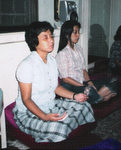Our eyes.
They blink together.
They move together.
They cry together.
They see things together.
They sleep together…
Though they never see each other.
That’s FRIENDSHIP!
(a Valentine text message)
Peace to all!
How do I use my eyes? What do I see? What images, colors, figures caught my sight?
These were some of the questions we reflected on and shared about as we tried to make sense of our sense of sight (we’re still on The Physical Self as the theme) at the Tuesday Inner Work Circle last Feb. 13.
It was a full house once again with an interfaith, intercultural and international group of participants from different faiths (Catholic, Hindu, Muslim, Buddhist, Shumei, Jeung San Do, etc.), and nations (Indian, Japanese, Korean, African, Bangladesh, Italian and local), and age groups (young-adult to young-golden).
We heard inspiring insights and provocative reflections on a simple topic—such as “seeing”—which turned out to be deep and wide-ranged.
Out of my own insight, I guess the most overused yet simply comprehensive expression that could relate the sense of sight with faith is: “To see is to believe.” (Or is it?).
I usually hear this sentence when a lawyer would reiterate the significance of hard evidences when defending a case in court, or when a scientist would emphasize how empirical data is the basis of scientific study or research. Empirical evidences are those which are actually observable or are experienced by the physical senses. Note that in observation (be it in a laboratory or in social research) the main sense being used is the sight.
Indeed, we humans as physical beings existing in the physical world always need to verify the truth with our senses. But would this also apply if we talk about spiritual truth?
I remember a passage in the Bible where Jesus said: “Blessed are those who believed without seeing.” He was talking to a disciple who didn’t believe Christ’s resurrection unless he’d “seen the risen Lord himself with his eyes and touched his fingers through his master’s wounds.” Jesus was praising the faith of those who did not doubt him and believed in the truth of the miracle even without empirical verification.
But does faith really have to be blind? After all, we still are “in this world although not of this world” (as Marites often puts it). Especially in this modern world full of deceit and false hopes, people turn to science or simply rely on their physical senses to verify what is true and believable.
One participant at the Inner Work Circle shared his experience of having been an atheist for 21 years and then “seeing the light” again through another faith. It shows how one could go through so much for so long looking for proof of the existence of God. And who could blame him?
Even God for so long has understood this human reasoning so much that numerous incarnations, prophets, masters, avatars, gurus, buddhas and what not have walked the earth or have manifested or “have been sent” (or however it is called)—just to give a glimpse of the Almighty, and Infinite Divine Power.
Our Muslim brother shared how the Qur’an is also known as the Book of Signs, the proof of the One God. I’d say: so goes for all the other holy scriptures. These are all the Words of God in different languages brought forth by the different sages and prophets. And just as God speaks in the language each individual will be able to understand, God also appears in the image, figure, form or manifestation that each can see and recognize.
We do need to see in order to believe. But we need to use different eyes. The physical eyes cannot see God because all that is spiritual and non-material is invisible and intangible.
True people of faith are not blind. They see God but not in visions or apparitions, not in their temples or altars, not in their spiritual masters, prophets and deities. True people of faith see God in the eyes of their neighbors, their children and family, in their co-workers, in the tindera in the corner, the beggar in the street, the prisoner in jail, even in the politicians or the rich fat capitalist businessmen. They see God even in the eyes of the most sinful of sinners and the cruelest of all enemies. Some even see God in the wisp of the wind, in the birds singing, in the eyes of a puppy, in a smooth rock in the clear river, in each blade of grass.
See what I mean?
skip to main |
skip to sidebar








updates/reflections/reports on The Peacemakers' Circle INNER WORK - Self Awareness Program

Go to

About the Tuesday Inner Work Circle
The Peacemakers' TIWC is a support group/sharing circle where ordinary people from different faith backgrounds share with one another insights, reflections, personal experiences and life challenges within the backdrop of their respective spiritual traditions as they strive to become true instruments of peace by practicing heart-listening and cultivating self-awareness and individual transformation.
About Me

- The Peacemakers' Circle Foundation, Inc. (TPCFI)
- The Peacemakers' Circle is a non-stock, not-for-profit, and non-partisan organization composed of people of diverse religions, spiritual expressions, and indigenous traditions who recognize the Oneness of Humanity and are guided by the Principles of Unity in Diversity, Good Will, and Cooperation. Thinking globally and acting locally, we strive to bring forth the highest ideals and teachings of our faith as we work together to promote spiritual self-awareness and “be the change that we wish to see in the world!”

Blog Archive
-
▼
2007
(26)
-
▼
June
(19)
- Your concept/image of God & You (June 19, 2007)
- Becoming out of God (June 12, 2007)
- God Concepts (An ex-atheist’s sharing - June 05, 2...
- More on Inner Peace (May 29, 2007)
- Inner Peace (May 22, 2007)
- The power of the Unspoken word (May 15, 2007))
- Celebrating the universal teachings of the Buddha ...
- Encounter with a Guru (Open Evening fieldtrip - Ap...
- Preparing humanity for a great transition (Apr. 17...
- Easter reflections (Apr. 10, 2007)
- Sharing Malaysia, Indonesia, India (Mar. 03, 2007)
- Spreading white Light (Open Evening with Byakko Sh...
- Care to lend an ear? (Feb. 02, 2007)
- Making Sense: Seeing (Feb. 13, 2007)
- My Physical Self (Feb. 06, 2007)
- Temple visit Hare Krishna (Jan. 30, 2007)
- Fears & Concerns in Life (Jan. 23, 2007)
- Introducing new Inner Work Self-Reflection (Jan. 1...
- Renewals & New Beginnings (Jan. 09, 2007)
-
▼
June
(19)
The TIWC Gang 2006

JOIN US
EVERY TUESDAY 6:00-8:00PM at The Peacemakers’ Circle (Unit 105 PhilDHRRA Partnership Center, 59 Salvador St., Varsity Hills, Loyola Heights, QC. – 2 blocks from McDonald’s/Shakey’s parallel Katipunan Ave. across Ateneo gate 2). Let us know if your dropping by – tel. 920-7622 or 0918-7822805 (OrlanD) ; peacemakerscircle_uri@yahoo.com


TIWC 2007

Visit the URI blogsite
Know more about the UNITED RELIGIONS INITIATIVE --
www.uriseapacific.org
www.uriseapacific.blogspot.com
www.uriseapacific.org
www.uriseapacific.blogspot.com
No comments:
Post a Comment